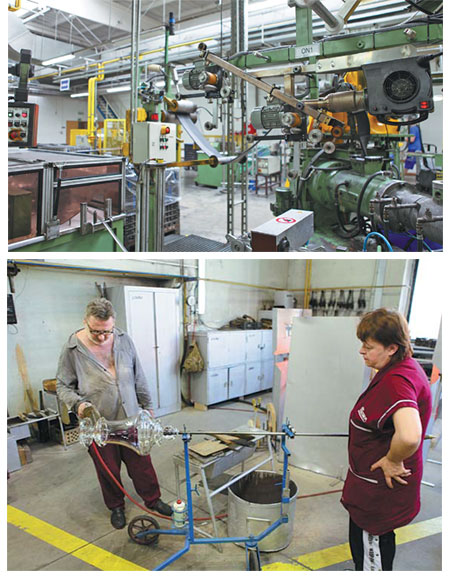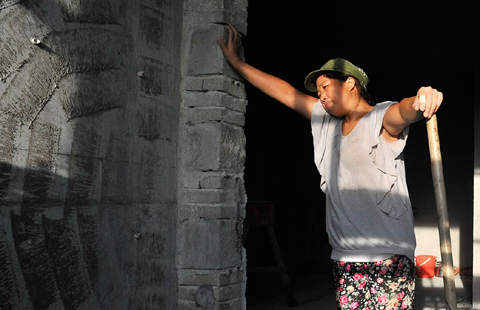Czech connection is crystal clear
Updated: 2014-10-10 07:33
By Cecily Liu(China Daily Europe)
|
|||||||||||
Geography offers a strategic advantage that many Chinese companies find hard to resist
The Czech Republic is pioneering a new way of collaboration with China, playing a crucial role in shaping China's trade and investment relationship with Central and Eastern European countries, and providing a springboard for Chinese companies to go global.
Half a dozen Chinese companies have established a solid presence in the Czech Republic, making the most of its skilled workforce, advanced technology supply chain and lower production costs compared with countries like France and Germany. They are thus able to build business operations that reach out to the whole of Europe.
The country's location makes delivering goods to the rest of Europe easy, and its membership in the European Union means Chinese companies manufacturing there can export tariff-free to the whole of the EU.
At the same time, hundreds of Czech companies are expanding their exports and investment into China, attracted by the big market and immense business opportunities at a time of economic sluggishness closer to home.
These companies cover a wide variety of sectors, ranging from financial services, medical equipment and services, to firms specializing in Czech crystals and automobiles.
"The Czech Republic has many great industries including cars, white goods and manufacturing, and those strengths provide great opportunities for Chinese collaboration," says Cheng Yongru, counselor for the economic and commercial section of the Chinese embassy in Prague.
"Many Chinese companies have operations in the Czech Republic serving the European market, and this is just the beginning of the trend," Cheng says.

As a former leading industrial powerhouse, the Czech Republic has maintained many elements of the industrial supply chain, so Chinese companies that invest there for production can comfortably find a supply of components.
The growing importance that China has placed on the Czech Republic strategically was underlined in a visit by China's Vice-Premier Zhang Gaoli to Prague in August to attend the fifth China Investment Forum and the second China-Central and Eastern Europe leaders' meeting.
Zhang was with a delegation of about 700 Chinese government representatives and entrepreneurs. The forums were organized by the Czech China Chamber of Collaboration and were attended by more than 1,000 professionals and business executives from China and Europe.
Many Chinese companies have already built factories in the Czech Republic, including the white goods manufacturer Sichuan Changhong Electric, the canned food producer Shanghai Maling Aquarius and Yuncheng Plate-making.
The Chinese telecommunications giant Huawei Technologies has become the Czech Republic's largest telecommunications equipment and service provider, and a supplier to O2, T-mobile and Vodafone, the country's three biggest operators.
Nie Jinwen, general manager of Yuncheng, says the company decided to open a factory in the Czech Republic to be close to customers and flexibly serve their needs.
"Sometimes we receive customer orders and are required to deliver the products the following day, so the model of manufacturing in China and shipping the products over would never work."
Yuncheng was founded in Shanxi province 30 years ago, specializing in providing professional rollers used in printing images on packaging. It has more than 80 subsidiaries worldwide.
Nie says that at the Czech factory, Yuncheng makes between 3,000 and 4,000 rollers a year, but its production has a lot of room for growth because the factory's full capacity is about 6,000 rollers a year.
Yuncheng's sales in the Czech Republic were worth 11 million yuan ($1.8 million; 1.42 million euros) in the year to September, compared with 8.5 million yuan in the previous corresponding period.
The Chinese shipping and logistics supplier COSCO established a subsidiary in the Czech Republic in September 2011 that oversees its operations there and in Austria, Hungary and Slovakia.
Zhou Xiaomin, managing director of COSCON Central Europe, who is based in Prague, says Central European parts of the business focus on container shipping and are managed by COSCO Container Lines Europe GmbH.
COSCO Container Lines Europe GmbH was founded in 2005. As the European regional headquarters under COSCO container lines Shanghai, it manages more than 40 offices and subsidiaries of COSCO container lines in and around Europe.
COSCON Central Europe is set up as a joint venture between COSCO and the Prague subsidiary of Vasco Shipping, a Spanish company, with COSCO being the majority owner.
"Locally, our staff search for potential customers for the container business, and then we provide follow-up support to local customers for the container shipping," Zhou says.
In recent years COSCO has focused on developing its business in Central Europe, where demand for container shipping is strong, he says.
In addition, Central Europe is a young market for COSCO with a lot of potential for growth, compared with Western European countries such as Belgium, Britain, France, Germany, Italy, the Netherlands and Spain, where its presence is more mature.
Although competition in the shipping business is tough, the support Zhou's team receives from COSCO's headquarters helps it to become competitive, he says. This support includes COSCO's comprehensive global network and information system, which allows containers to be transported quickly and efficiently, he says.
In addition, COSCO's constant drive for innovation gives it an advantage, one example being the recent addition of a new transport route through Greece.
Before that route was added, COSCO transported its containers into Central Europe through either Hamburg in Germany or Koper in Slovenia. Once the items reach a port, they are taken by truck or train to their final destinations.
Zhou says many of COSCO's customers in Central Europe are local companies that export timber, chemical products and paper to China and globally. In comparison, many of the imports transported into Central Europe are white goods, consumer goods and textile products from the Far East.
One success story of a Czech company expanding quickly after capital received from a Chinese acquisition is Saar Gummi, a car sealing system manufacturer acquired by Chongqing Light Industry & Textile Holding in 2011.
"The acquisition allowed us to grow, develop a long-term plan and get new orders for our products," says Jan Tichy, executive director of Saar Gummi Czech s.r.o.
Tichy says that new investment in Saar Gummi has enabled it to build a new mixing room for rubber compounds, and production began this year.
Before building the 10 million euros ($13 million) mixing room, Saar Gummi had to buy its rubber material from external suppliers, but now this is produced in-house, Tichy says.
Many Czech companies have expanded into China, one being the country's iconic crystal brand Moser. The brand, founded by Ludwig Moser (1833-1916), started as an engraver's workshop in the town of Karlovy Vary in western Bohemia in 1893 and has grown into a world-famous brand, producing glasswork for many European royals and celebrities.
The brand stands out in its attention to detail and elaborate use of colors, says export director Jaroslav Trejbal. "All our products are handmade and on average 35 skilled workers contribute their skills to one particular product."
About a decade ago, Moser expanded into China through partnerships with two Chinese retailers, in Beijing and Shanghai. One tends to stock more modern pieces and the other one more art nouveau pieces, Trejbal says.
But now Moser is trying to find a strategic partner in China that can take care of the brand's positioning, promotion and distribution there, Trejbal says.
In the automotive sector, the signature Czech brand Skoda Auto is now becoming increasingly popular in China, and production of Skoda cars began in China in 2005, starting with the Octavia model, and followed by the Fabia, Superb, Rapid and Yeti.
In China, Skoda cars are made in Shanghai and some other smaller cities. The Shanghai factory was established through a joint venture between Skoda's parent company Volkswagen Group and the Chinese company SAIC in 1984, initially to produce Volkswagen models.
Last year, Skoda says, it sold 227,000 cars in China, and it said during the Beijing Motor Show in April that it aims to sell 500,000 cars a year by 2018.
In addition to Skoda Auto, Skoda Machine Tool and Skoda Electric, two other subsidiaries of the group, have set up operations in China.
Other Czech manufacturing industry firms that have sales in China include Ravak, which makes bathroom equipment; Petrof, which makes pianos; Tos Varnsdorf, which makes machine tools; and Koh-i-Noor Hardtmuth, which makes pencils, pens and art supplies.
Many Czech medical companies and organizations are also eagerly expanding into China, one of them being University Hospital Motol in Prague, which is the main referral hospital for children in the country. Motol works with two Chinese hospitals, Beijing Children's Hospital and Ruijing Hospital in Shanghai.
Ludek Navara, deputy business manager of Motol, says collaboration began last year when his team visited Beijing and Shanghai on a business trip, and they have built up a relationship to do scientific collaboration.
"The collaboration focused on exchange of experiences, executed by means of a visit. We are still drawing up the plans of specific research projects, and they will begin soon."
Because Motol is a hospital for children, it has been decorated to appeal to them, and on one wall is a big drawing showing a mole and a panda, the Czech Republic's and China's symbolic animals, as friends. Navara says the head of Beijing Children's Hospital drew the mole on her last visit to Prague.
Linet, a company specializing in healthcare products, expanded into China initially in 2005 in partnership with a Chinese distributor, through whom Linet would sell its intensive care beds, care units, surgical beds and other products.
Tomas Kolar, executive committee member of Linet Group SE, says Linet's beds have many functions that suit the needs of the patient, including lateral tilting. Another feature is a safety monitor that keeps track of a patient's movement in bed and sends out an alert if he or she is not in the correct position.
Linet has China's elder population as a target market for its operations, Kolar says.
"In China, aging is a big concern that is creating a lot of market demand for suitable products, especially as the one-child policy has put a lot of burden on younger generations to care for older family members."
To meet demand in China for elder care, Kolar says his team is setting up a consultancy in the country called Sinocare. It will train nurses and managers how to care for the elderly, and work with architects to design buildings suitable for seniors so they can have a high quality of life.
"We don't just want to sell high-quality products to China, but we want to make our customers understand why they buy high-quality products."
Opportunities for collaboration between the Czech Republic and China are prominent in automotive, chemicals, financial services, general machinery and healthcare, says Vladimir Dlouhy, president of the Czech Chamber of Commerce.
"We would like to see more cooperation across the board, because Czech companies have a modest presence in China, (a country that) has changed immensely in the past 30 years. We have missed some of the opportunities, and we'd like to see more realized."
cecily.liu@chinadaily.com.cn
|
Top: The factory of Saar Gummi in the Czech Republic. The car sealing system manufacturer was bought by Chongqing Light Industry & Textile Holding in 2011. Above: Workers at the factory of Moser in the Czech Republic. Photos by Cecily liu / China Daily |
(China Daily European Weekly 10/10/2014 page16)
Today's Top News
On this beach no one is naked
Barrage of deals expected on Europe trip
First US Ebola patient dies
Sino-Portuguese relations make 'giant leap' forward
Holiday spending habits change
Book of Chinese president debuts at Frankfurt fair
China's 'Nightingale' races for Oscar
Britain to deploy 750 servicemen in West Africa to tackle Ebola
Hot Topics
Lunar probe , China growth forecasts, Emission rules get tougher, China seen through 'colored lens', International board,
Editor's Picks

|

|

|

|

|

|






